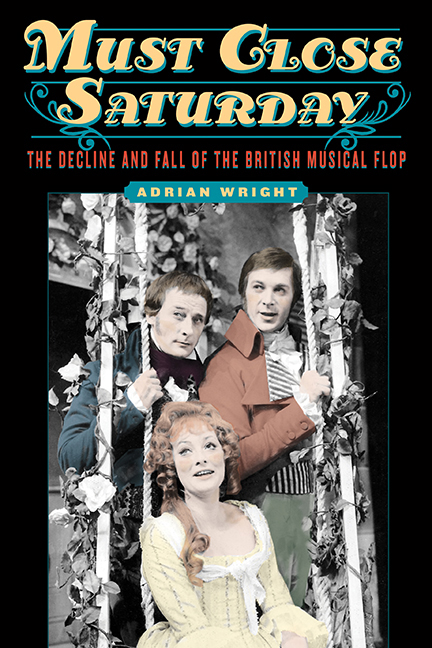Book contents
- Frontmatter
- Contents
- List of Illustrations
- Preface and Acknowledgements
- 1960
- 1961–1964
- 1965–1966
- 1967–1969
- 1970–1972
- 1973–1976
- 1977–1979
- 1980–1983
- 1984–1989
- 1990–1999
- 2000–2005
- 2006–2016
- Appendix: British Musical Flops in London 1960–2016
- Notes to the Text
- Select Bibliography
- Index of Musical Works
- General Index
- Frontmatter
- Contents
- List of Illustrations
- Preface and Acknowledgements
- 1960
- 1961–1964
- 1965–1966
- 1967–1969
- 1970–1972
- 1973–1976
- 1977–1979
- 1980–1983
- 1984–1989
- 1990–1999
- 2000–2005
- 2006–2016
- Appendix: British Musical Flops in London 1960–2016
- Notes to the Text
- Select Bibliography
- Index of Musical Works
- General Index
Summary
‘One more show off the camp necrophiliac assembly line’
Financial Times on The Mitford Girls1980: Barnardo Colette The Biograph Girl
Teeming with chirpy (but sometimes starving or dying) children, telling ‘A Legend Set to Music’, with its hero's name known to every charity-conscious theatregoer in the land, and with a percentage of each ticket sold going to Barnardo's Homes (it had worked for Peter Pan and Great Ormond Street Hospital), how could Barnardo (Royalty Theatre, 22 May 1980; 43) fail? The pre-performance ballyhoo promised a sentimental and plucky experience: ‘It will make you laugh, cry and will capture your imagination from the rise of the curtain to the end of the show. You'll love the children – Ginger, Monty Something-stein, Jim Jarvis, Tosh and many other cockney characters.’
Punters couldn't say they hadn't been warned. At the Royalty, safely away from the West End on Kingsway, the George Mitchell Singers, or a section of them temporarily relieved of their duties in The Black and White Minstrel Show, were ready with songs that had sentimental, plucky titles, ‘Snuggle Up’ and ‘Lovely ‘ot Pies’ (why never ‘Hot’ in such cases?). Book, music and lyrics were the work of its director Ernest Maxin, best known as a television producer of popular entertainment. On this evidence, his knowledge of modern musicals was negligible. As it happened, he could hardly have chosen a more serious subject, although it's likely that any attempt to dramatise it would have unleashed just as much cockney capering.
One of the great humanists of his age, Thomas Barnardo roamed the poverty-stricken hell-holes of Victorian London, rescuing boys who had fallen into starvation, destitution and were prey to all manner of abuse. From such beginnings grew the estimable organisation that would bear his name. Maxin's seemingly irreconcilable dilemma was how to paint the tragic picture, including the various personal tragedies that fall into any life, but keep audiences believing they'd come in out of the cold to see another Oliver! There was an attempt to present an authentic picture: Ivan Henry, who conceived the idea of musicalising the story and in 1972 persuaded Maxin to take it on, was credited in the programme with ‘Research’.
- Type
- Chapter
- Information
- Must Close SaturdayThe Decline and Fall of the British Musical Flop, pp. 145 - 166Publisher: Boydell & BrewerPrint publication year: 2017

